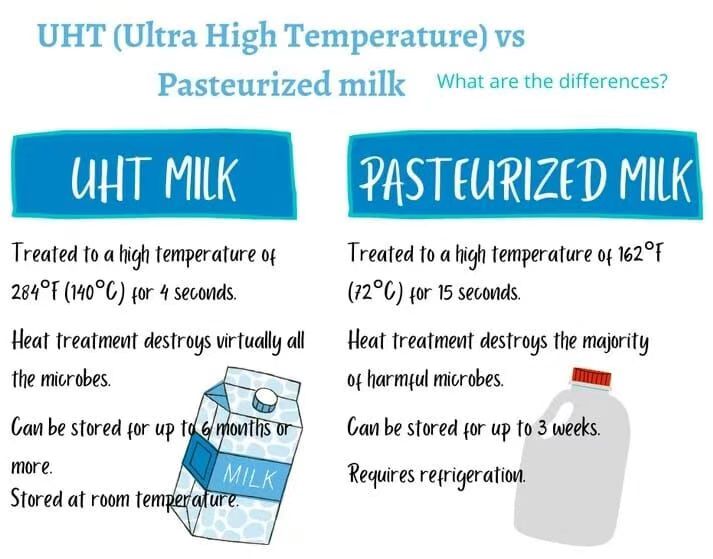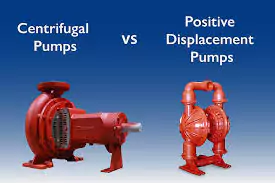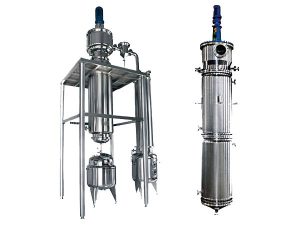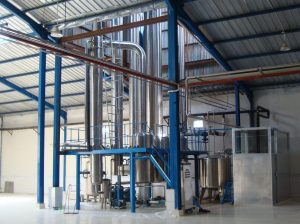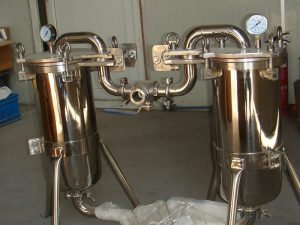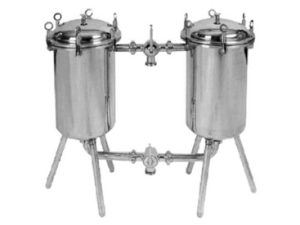In the dairy industry, efficiency and hygiene are non-negotiable. Every stage of production—from raw milk collection to pasteurization, homogenization, and CIP (Clean-in-Place) cleaning—depends on reliable pumping systems. Centrifugal pumps are the backbone of these operations, ensuring smooth transfer of liquids under sanitary conditions.
Unlike generic pumping systems, centrifugal water pumps designed for food and beverage use meet strict hygiene standards and reduce downtime, making them an essential investment for dairy equipment manufacturers and plant operators. Choosing the right pump is not just about moving fluids—it is about reducing costs, improving productivity, and safeguarding product quality.
Lets explore 12 different centrifugal pump types in this bolg.
Table of Contents
ToggleWhat Are Centrifugal Pumps?
A centrifugal pump works by using an impeller to convert rotational mechanical energy into hydraulic energy, moving fluids efficiently. In dairy plants, they handle milk, cream, whey, and cleaning fluids.
Key Pump Centrifugal Parts
-
Impeller – provides velocity to the fluid.
-
Casing – directs and controls fluid flow.
-
Shaft & Bearings – provide stability.
-
Mechanical Seal – prevents leakage, essential for hygienic dairy operations.
-
Motor – drives the impeller.
Why Centrifugal Pumps Matter in Dairy Processing
-
Compliance with Food Standards – Stainless steel designs (3A, EHEDG certified).
-
Efficient Handling of Dairy Fluids – From low-viscosity milk to high-fat cream.
-
Energy Savings – Lower operational costs in high-capacity plants.
-
Hygienic Operation – Compatible with CIP/SIP systems for easy cleaning.
-
Long-Term ROI – Less wear, fewer breakdowns, and reduced downtime.
12 Types of Centrifugal Pumps Used in the Dairy Industry
Sanitary Centrifugal Pumps
Sanitary centrifugal pumps are specifically designed to meet strict hygiene standards such as EHEDG and FDA regulations. Constructed with polished stainless steel and fitted with crevice-free impellers, these pumps prevent bacterial growth and ensure contamination-free transfer of milk, yogurt bases, and dairy concentrates. Their compatibility with CIP and SIP (Sterilize-in-Place) processes makes them the cornerstone of any dairy operation. For Businessbuyers, investing in sanitary centrifugal pumps means long-term compliance, reduced recalls, and higher consumer trust in end products.
Multistage Centrifugal Pumps
Multistage centrifugal pumps incorporate multiple impellers arranged in series to achieve higher discharge pressures. This design is critical for operations like milk powder production, boiler feed systems, or reverse osmosis water treatment used in dairy plants. By generating greater head capacity without compromising flow consistency, these pumps ensure efficient water circulation and heating processes. Their robust build and precision engineering make them ideal for energy-intensive dairy applications where reliability and efficiency are top priorities.
Self-Priming Centrifugal Pumps
Self-priming centrifugal pumps are engineered to automatically evacuate air from the suction line, allowing them to start pumping without manual priming. This makes them highly effective for CIP (Clean-in-Place) systems, wastewater handling, and situations where intermittent flow is expected. In dairy facilities, they ensure quick recovery during cleaning cycles and drainage processes, even when pipelines are partially filled with air. Their ability to handle foamy, aerated liquids while maintaining hygienic performance makes them a versatile choice in fluid management.
Vertical Centrifugal Pumps
Vertical centrifugal pumps are designed for installations where space efficiency is critical. Mounted upright, they save floor space in crowded dairy processing plants and are commonly used in sump applications or CIP return systems. Their vertical shaft and submerged impeller configuration make them reliable for handling large volumes of cleaning solutions, hot water, or chilled water circulation. The vertical layout also simplifies maintenance by minimizing alignment issues, ensuring continuous plant operation.
Horizontal Split-Case Pumps
Horizontal split-case pumps are heavy-duty centrifugal water pumps built with a double-suction impeller, enabling high-capacity flow with reduced axial thrust. In dairy plants, they are widely employed in central chilled water circulation, condensate return, and large-scale raw milk transfer. Their split-case design allows for easier access to internal centrifugal pump parts during servicing, minimizing downtime in high-demand production environments. Built for durability, they handle continuous 24/7 operation, making them ideal for large dairy factories and integrated processing facilities.
Magnetic Drive Centrifugal Pumps
Magnetic drive centrifugal pumps eliminate mechanical seals by using magnetic coupling, preventing fluid leakage and ensuring contamination-free operation. This is particularly critical in dairy processing, where product purity is paramount. They are excellent for handling cream, probiotic mixes, or additives that must remain sterile. With no seal wear and minimal maintenance, magnetic drive pumps reduce total cost of ownership while ensuring safe, hygienic transfer of sensitive fluids. Their sealless design also protects operators from exposure to cleaning chemicals in CIP operations.
End-Suction Pumps
End-suction pumps are among the most widely used centrifugal pump types in the dairy industry. Their simple, single impeller design and horizontal orientation make them compact, cost-efficient, and easy to install. These pumps handle low- to medium-viscosity dairy liquids such as milk, cream, or whey with minimal pulsation. Stainless steel models with hygienic seals ensure compliance with food-grade requirements, while replaceable pump centrifugal parts reduce downtime during maintenance. Commonly applied in raw milk transfer, buffer tank circulation, and pasteurization lines, end-suction pumps are an entry-level yet indispensable solution for dairy plants.
Open Impeller Pumps
Open impeller centrifugal pumps feature vanes without shrouds, making them suitable for liquids containing soft solids or viscous dairy products like flavored milk or fruit-added yogurt blends. Their design minimizes clogging risks and allows quick cleaning, aligning perfectly with dairy’s sanitation requirements. These pumps are also effective in whey protein concentrate handling, where small solid particles are present. Easy inspection and maintenance further enhance their operational reliability.
Closed Impeller Pumps
Closed impeller pumps, with fully shrouded vanes, deliver higher efficiency when handling thin, clean liquids such as skim milk, whey, or pasteurized dairy fluids. Their tighter clearances improve hydraulic efficiency but require careful maintenance to prevent clogging. In dairy plants, they are often installed in processes demanding energy savings and high-volume throughput. With durable stainless-steel construction, closed impeller pumps strike a balance between performance and hygiene, making them an attractive option for large-scale liquid transfer.
Single-Stage Centrifugal Pumps
Single-stage centrifugal pumps use one impeller to generate flow and pressure, making them one of the simplest yet most versatile centrifugal pump types in dairy. They are used extensively for milk transfer, chilled water circulation, and ingredient dosing where moderate pressure is sufficient. Their affordability, easy installation, and straightforward maintenance make them a preferred choice for mid-sized dairy operations looking for cost-effective pumping solutions.
High-Pressure Centrifugal Pumps
High-pressure centrifugal pumps are engineered for applications that require robust performance under demanding conditions. In dairy plants, they are used for feeding homogenizers, spray drying systems, and filtration processes where consistent pressure is essential. Their ability to sustain strong discharge pressure ensures process stability and prevents product loss. Built with high-grade materials, these pumps withstand rigorous operating conditions while delivering energy-efficient performance.
CIP Centrifugal Pumps (Dedicated)
CIP centrifugal pumps are specialized units designed to circulate cleaning agents, hot water, and sanitizing solutions throughout dairy pipelines and tanks without disassembly. Their corrosion-resistant construction and high flow rates enable effective cleaning of production equipment while meeting food safety standards. By integrating dedicated CIP pumps, dairy plants can reduce cleaning downtime, improve hygiene compliance, and extend equipment lifespan. For Business buyers, these pumps represent a critical investment in operational efficiency and regulatory assurance.
Below is a breakdown of different kinds of centrifugal pumps and how they are applied in dairy plants.
| Pump Type | Key Features | Typical Dairy Application |
|---|---|---|
| 1. Sanitary Centrifugal Pumps | Polished stainless steel, FDA-compliant | Direct milk handling |
| 2. Multistage Centrifugal Pumps | Multiple impellers, high pressure | Pasteurization, spray drying systems |
| 3. Self-Priming Pumps | Handles air-liquid mixtures | CIP return systems |
| 4. Vertical Centrifugal Pumps | Space-saving design | Whey or brine recirculation |
| 5. Horizontal Split-Case Pumps | Easy to maintain, high flow | Cooling water circulation |
| 6. Magnetic Drive Pumps | Seal-less, leak-proof | Hygienic transfer of cream |
| 7. End-Suction Pumps | Compact, easy to install | General milk transfer lines |
| 8. Open Impeller Pumps | Can handle fluids with solids | Ice cream mix with particulates |
| 9. Closed Impeller Pumps | High efficiency | Raw milk transfer |
| 10. Single-Stage Pumps | Simple, economical | Chilled water circulation |
| 11. High-Pressure Pumps | Withstand strong pressure | UHT sterilization systems |
| 12. CIP Centrifugal Pumps | Built for clean-in-place | Sanitation and hygiene cycles |
👉 These centrifugal pump types cover the full spectrum of dairy operations, ensuring both efficiency and product safety.
Conclusion
The dairy industry relies on centrifugal pumps for everything from milk transfer to pasteurization and CIP cleaning. Selecting the right types of centrifugal pumps ensures not only smooth operations but also compliance, cost savings, and higher product quality.
👉 If you’re seeking customized centrifugal pump solutions for dairy applications, our engineering team can help you select the most suitable model, optimize pump centrifugal parts for durability, and ensure compliance with international standards.
Contact us today for technical consultation and tailored proposals designed to maximize your dairy plant’s performance.

